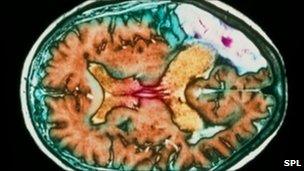Drug 'could reduce stroke damage'
- Published

Blocking a molecule which stops brain cells working properly after a stroke could help people recover better.
Californian scientists, writing in the journal Nature, said doing this in mice helped reverse the effects of a stroke.
A treatment based on this approach could be given days later, while conventional treatments need far quicker action.
The Stroke Association said far more testing would be needed on any new drug.
Strokes happen when an area of brain cells is starved of oxygen, due to a blocked or burst blood vessel.
Cells start to die in the affected area, and while nothing can bring these back, scientists know the cells immediately surrounding the damaged area play a crucial role in the ability of the brain to recover and compensate for the damage.
This process of "re-wiring", in which neighbouring brain cells make new connections to replace some of those lost during the stroke, can partly determine the degree of long-term disability some patients will suffer.
Professor Anthony Rudd of St Thomas' Hospital explains what happens during and after a stroke
The researchers, from the University of California in Los Angeles, found that a natural process within the surrounding brain cells appeared to be getting in the way of recovery.
A build-up of a molecule called GABA appeared to dampen down activity in these cells at a time when they should be working hard to make new connections.
When strokes were induced in mice, giving them a drug which blocked the effects of this molecule appeared to improve their ability to recover movement.
Altering the genetic make-up of the mice to be less responsive to GABA produced similar results, adding weight to the theory.
The researchers believe that their work offers the prospect of a new type of drug to boost recovery in stroke patients.
Although trials in humans would still be some way off, the results in mice point to another significant advantage.
At present, strategies to limit stroke damage include giving 'clot-busting' drugs as quickly as possible after a stroke to try to limit the area of the brain affected.
This leads to a race against time to deliver the drug as soon as possible.
The Californian researchers found that blocking GABA produced the best results if done three days after the stroke - in fact, doing it immediately actually worsened stroke damage.
Dr Sharlin Ahmed, from the Stroke Association, said the need to give current treatments quickly, and the fact that not every stroke patient could receive them, meant that there was a "great need" for new ways to improve recovery and limit damage.
She added: "This is an interesting study, however it has only been tested on mice so far, and further research is needed to find out if it could be as effective in humans."
- Published29 October 2010
- Published22 July 2010